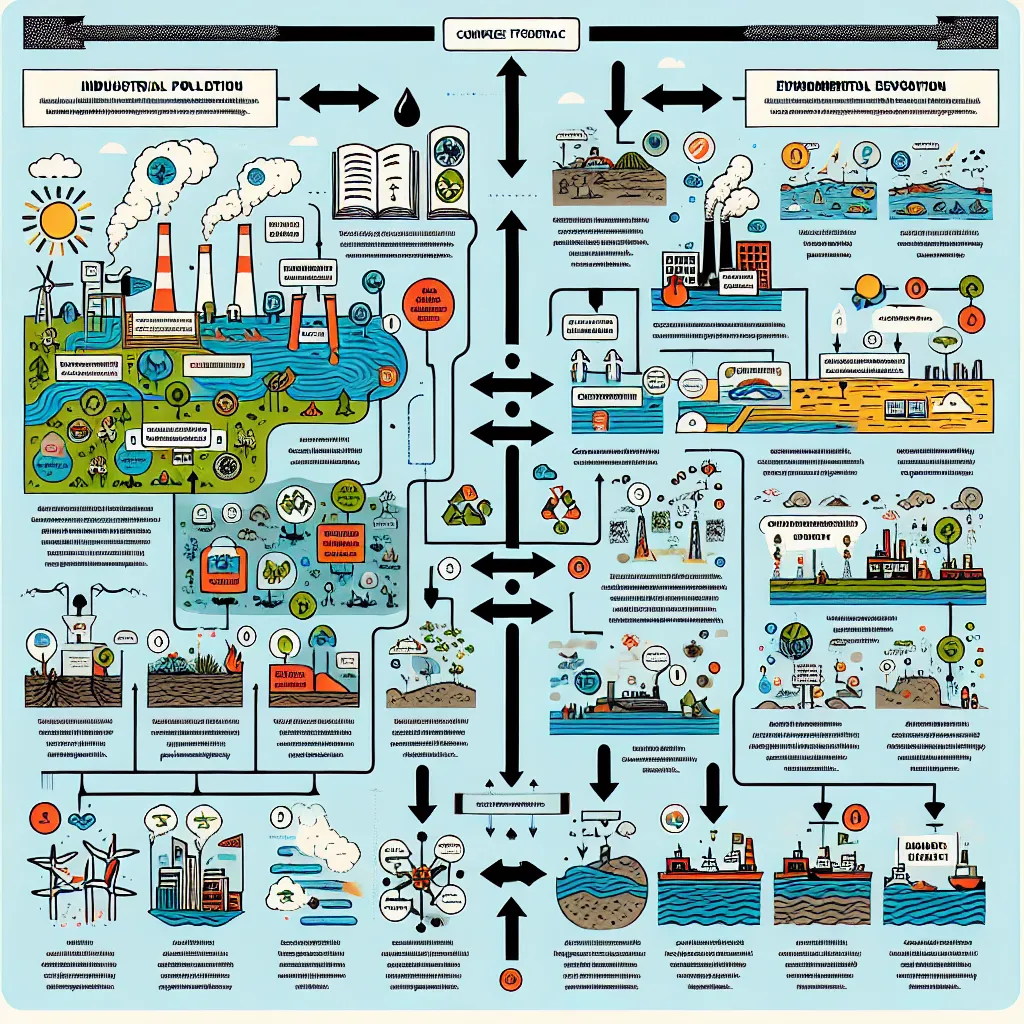Environmental pollution has become a pressing global issue, and the question of corporate responsibility is increasingly prominent in IELTS Writing Task 2. This topic, centered around “should companies be held accountable for environmental pollution,” has appeared in various forms in past IELTS exams and is likely to remain relevant in future tests. Let’s explore this crucial subject through analysis and sample essays for different band scores.
Nội dung bài viết
Analyzing the Task 2 Question
Let’s focus on a common formulation of this topic:
Some people think that companies and individuals should pay to clean up the environment in proportion to the amount of pollution they have produced. Do you agree or disagree?
This question addresses corporate environmental responsibility, a key aspect of contemporary environmental debates. It requires candidates to consider the concept of “polluter pays” and express their opinion on its validity and practicality.
Sample Essay 1: Band 8-9 Response
Environmental pollution is a critical issue facing our planet, and the notion of making polluters pay for cleanup efforts has gained traction. I strongly agree with this approach, as it not only addresses the immediate problem but also creates incentives for more responsible behavior in the future.
Firstly, the principle of proportional responsibility is fundamentally fair. Companies and individuals that profit from activities causing pollution should logically bear the costs of mitigating that pollution. This approach aligns with the ethical concept that those who create problems should be responsible for solving them. For instance, if a factory releases harmful chemicals into a river, it should be financially liable for the subsequent cleanup and restoration of the ecosystem.
Moreover, implementing this policy would create a powerful economic incentive for reducing pollution. When the cost of pollution is internalized, companies are more likely to invest in cleaner technologies and processes to avoid hefty cleanup fees. This could drive innovation in green technologies and sustainable practices, benefiting the environment in the long term. For example, automotive companies might accelerate their transition to electric vehicles if they faced significant charges for the air pollution caused by combustion engines.
However, it’s crucial to acknowledge that implementing such a system would face challenges. Accurately measuring pollution levels and attributing them to specific sources can be complex, especially for individuals. Additionally, there’s a risk that some companies might attempt to evade responsibility through legal loopholes or by relocating to regions with laxer environmental regulations.
To address these challenges, a comprehensive and globally coordinated approach would be necessary. This could involve international agreements, standardized measurement techniques, and robust enforcement mechanisms. While complex, such a system could significantly contribute to global environmental protection efforts.
In conclusion, I firmly believe that making polluters pay proportionally for environmental cleanup is a just and potentially effective approach. By aligning economic interests with environmental protection, this policy could drive meaningful change in corporate and individual behavior, ultimately contributing to a cleaner, more sustainable world.
(Word count: 309)
Analysis of Band 8-9 Essay
This essay demonstrates several key features of a high-scoring IELTS Writing Task 2 response:
- Clear position: The writer’s stance is evident from the outset and consistently maintained.
- Logical structure: The essay follows a clear introduction-body-conclusion format with well-developed paragraphs.
- Cohesion and coherence: Ideas flow smoothly with appropriate use of linking words and phrases.
- Lexical resource: The essay employs a wide range of vocabulary accurately (e.g., “mitigating,” “internalized,” “laxer”).
- Grammatical range and accuracy: Complex sentence structures are used effectively without errors.
- Task response: All parts of the question are addressed, including potential challenges and solutions.
 Corporate environmental responsibility
Corporate environmental responsibility
Sample Essay 2: Band 6-7 Response
In today’s world, environmental pollution is a big problem. Some people think that companies and individuals should pay to clean up the environment based on how much pollution they cause. I agree with this idea because it seems fair and could help reduce pollution.
First, it’s fair to make those who pollute pay for cleaning up. If a company makes money by doing things that harm the environment, they should be responsible for fixing the damage. For example, if a factory pollutes a river, they should pay to clean it up. This way, the cost of pollution is not passed on to everyone else.
Second, this approach could encourage companies and people to pollute less. If they know they’ll have to pay for cleanup, they might try harder to find ways to reduce their pollution. This could lead to new inventions that are better for the environment. For instance, car companies might work harder on making electric cars if they had to pay for the air pollution from regular cars.
However, there are some problems with this idea. It might be hard to figure out exactly how much pollution each company or person causes. Also, some companies might try to avoid paying by moving to countries with less strict rules about pollution.
To make this work, we would need good laws and ways to measure pollution accurately. Countries would need to work together to stop companies from avoiding their responsibilities. This would be difficult, but it could help protect the environment worldwide.
In conclusion, I think making polluters pay for cleanup is a good idea. It’s fair and could help reduce pollution. While there are challenges, with the right systems in place, this approach could make a real difference in protecting our environment.
(Word count: 282)
Analysis of Band 6-7 Essay
This essay demonstrates several characteristics of a Band 6-7 response:
- Clear position: The writer’s opinion is stated and maintained throughout.
- Adequate structure: The essay has a clear introduction, body, and conclusion.
- Some cohesion: Ideas are generally linked, though not always smoothly.
- Sufficient vocabulary: The essay uses some less common vocabulary (e.g., “encourage,” “inventions”), but with less precision than the Band 8-9 essay.
- Grammar: There’s a mix of simple and complex sentences, with occasional errors that don’t impede understanding.
- Task response: The main points of the question are addressed, though with less depth and nuance than the higher band essay.
Key Vocabulary for This Topic
-
Environmental pollution (noun) /ɪnˌvaɪrənˈmentl pəˈluːʃn/: The contamination of the environment by harmful substances.
-
Corporate responsibility (noun) /ˈkɔːpərət rɪˌspɒnsəˈbɪləti/: The idea that businesses should act in ways that benefit society and the environment.
-
Accountability (noun) /əˌkaʊntəˈbɪləti/: The fact or condition of being accountable; responsibility.
-
Mitigation (noun) /ˌmɪtɪˈɡeɪʃn/: The action of reducing the severity, seriousness, or painfulness of something.
-
Incentive (noun) /ɪnˈsentɪv/: A thing that motivates or encourages someone to do something.
-
Sustainable (adjective) /səˈsteɪnəbl/: Able to be maintained at a certain rate or level.
-
Ecosystem (noun) /ˈiːkəʊˌsɪstəm/: A biological community of interacting organisms and their physical environment.
-
Proportional (adjective) /prəˈpɔːʃənl/: Corresponding in size or amount to something else.
-
Internalize (verb) /ɪnˈtɜːnəlaɪz/: To make (attitudes or behavior) part of one’s nature by learning or unconscious assimilation.
-
Loophole (noun) /ˈluːpˌhəʊl/: An ambiguity or inadequacy in the law or a set of rules.
Conclusion
The topic of corporate accountability for environmental pollution is likely to remain relevant in IELTS Writing Task 2. To prepare, practice writing essays on related themes such as:
- The role of government regulations in environmental protection
- Individual responsibility versus corporate responsibility for pollution
- The impact of environmental policies on economic growth
Remember, the key to success in IELTS Writing Task 2 is not just about knowledge, but also about how you structure your arguments and express your ideas clearly and coherently. Practice regularly and don’t hesitate to share your essays in the comments section below for feedback and discussion. This active engagement can significantly enhance your writing skills and prepare you effectively for the IELTS exam.


